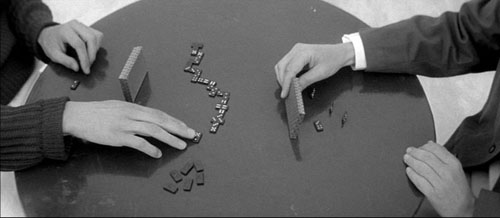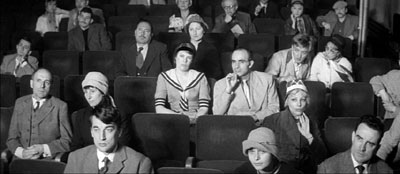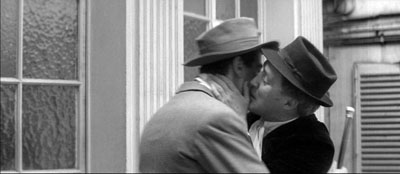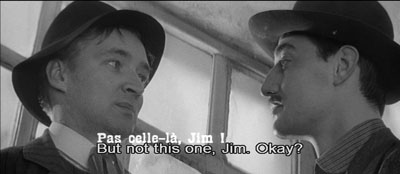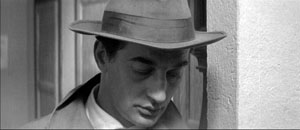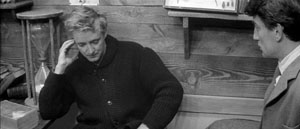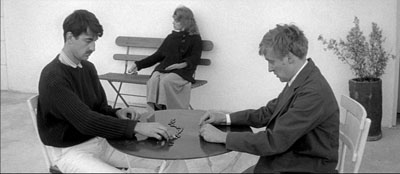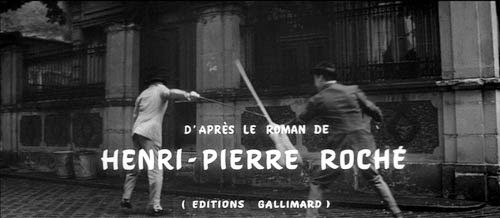Games cinephiles play
Sunday | August 3, 2008 open printable version
open printable version
From DB:
The Europeans have long been fascinated by the subject of cinephilia. The French supplied not only the word but the most outstanding instances, from the founding of Cahiers du cinéma to the passions of the Nouvelle Vague. (1) In the last decade particularly, French critics have often returned to the subject–worrying, for instance, that home video might have changed or even decimated cinephilia–and this has led critics from other countries to join in.
I was reminded of how strongly the idea persists when, at Il Cinema Ritrovato this year, I was invited to sit in on one of several lunches at which critics and historians talked about the subject. The discussion consisted mostly of recollections of the guests’ first encounters with cinema, of the films that affected them most powerfully, of the film-related activities they engaged in during their salad days. Some of us hadn’t done this exercise in autobiography before, but others had had practice. Jonathan Rosenbaum and Eric de Kuyper had both written a fair amount about the sources of their affinity for film. (Sometimes I feel I remember Jonathan’s life better than my own.)
What is cinephilia? Literally, the love of film. But everybody likes, even loves film, no? The term “cinephilia” connotes an overwhelming passion for film, even an obsession about it. And not just particular films. I meet civilians all the time who are devoted to their favorites—The Godfather, The Princess Bride, The Matrix. But they’re not cinephiles. So is it just a matter of quantity? Is it just that the cinephile enjoys a great many movies? Partly, but there’s still more to it.
The cinephile displays symptoms of cinemania, as chronicled in the film of the same name. If you haven’t seen it, Cinemania tracks five people who organize their lives around watching movies. As I watched it, some of my reactions ran to “Wow, that is really hard-core,” but every now and then I thought: “Well, that‘s not so weird. I do that.” So I see the similarities.
Most obviously, both the cinephile and the cinemaniac show symptoms of compulsiveness. Each one makes lists, checks off titles seen, plans a day of moviegoing with care. When visiting a new city, s/he first scans the cultural scene for what’s playing. Both types of film lover are strict—no pan-and-scan, no colorization, no dodgy projection. Either type might have a weblog or a diary or just patient friends. If s/he has friends.
But I do see differences. For one thing, most cinemaniacs like only certain sorts of movies—usually American, often silent, sometimes foreign, seldom documentaries. Do cinemaniacs line up for Brakhage or Frederick Wiseman? My sense is not.
Cinephiles by contrast tend to be ecumenical. Indeed, many take pride in the intergalactic breadth of their tastes. Look at any smart critic’s ten-best lists. You’ll usually see an eclectic mix of arthouse, pop, and experimental, including one or two titles you have never heard of. Obscurity is important; a cinephile is a connoisseur.
The real crux, I think, is this. The cinephile loves the idea of film.
That means loving not only its accomplishments but its potential, its promise and prospects. It’s as if individual films, delectable and overpowering as they can be, are but glimpses of something far grander. That distant horizon, impossible to describe fully, is Cinema, and it is this art form, or medium, that is the ultimate object of devotion. In the darkening auditorium there ignites the hope of another view of that mysterious realm. The pious will call Cinema a holy place, the secular will see it as the treasure-house of an artform still capable of great things. The promised land of cinema, as experimentalists of the 1920s called it: that, mystical as it sounds, is my sense of what the cinephile yearns for.
This separates the cinephile from the lover of novels or classical music. They love their art, I suspect, because of its great accomplishments. Who with literary or musical taste would embrace the subpar novel or the apprentice toccata? But cinephiles will watch damn near anything looking for a moment’s worth of magic. Perhaps this puts cinephiles closer to theatre buffs. They too wait hopefully for the sublime instant that flickers out of amateur performances of Our Town and Man and Superman.
That’s also why I think that the cinephile finds the desert-island question so hard to answer. What movies would I want to live with for the rest of my life? All of them, especially the ones I haven’t yet seen.
Another difference: Fussiness and solitude. The cinemaniac has a favorite seat, even if it’s way off to the side. To secure it, the cinemaniac shows up early and tries to be first in line. Your average cinephile isn’t so picky about where to sit, and so may slip in at the last minute. While waiting for the show to start, the cinemaniac seldom acknowledges others; a book is the faithful companion. But the cinephile is, if not extroverted, at least gregarious and wants to talk with other cinephiles.
What sort of talk? I’m glad you asked.
Cooperative games: Playing well with others
Jules and Jim leave a screening.
Jules: Great movie!
Jim: Yeah, great!
Jules: Well, see ya.
Jim: Yup, later.
This is the minimal, polite cooperative game. When the energy level is cranked up, you get something like this.
Jules: Great movie! I love M*x *ph*ls.
Jim: God, yes. Those camera movements knock me out.
Jules: But then there’s R*n**r too!
Jim: God, I love R*n**r. And M*z*g*ch*–there’s a man for camera movements.
Jules: My man! M*z*g*ch* is just terrific.
This can go on indefinitely. To get a sense of how special cinephiliac enthusiasms are, imagine littérateurs talking about Keats, Shelley, Coleridge, and iambic pentameter in these terms.
A cooperative game can go a little further.
Jules: What a fantastic movie!
Jim: Yes, fabulous. M*nn*ll* movies get better and better, the more you see them.
Jules: I completely agree—except for The S*ndp*p*r.
Jim: Yeah, that’s kind of weak, but it’s got some good points.
Jules: Really? I haven’t seen it in twenty years.
Jim: I have a pretty good copy off Turner. Let me dub it and send it to you.
Jules: That’s really nice of you.
Even if Jim never sends the disc, he has played the game charitably and Jules has accepted graciously.
Jim: What a terrific movie.
Jules: I wasn’t so impressed. Want to grab a coffee and talk about it?
Jim: Good idea!
This is probably the optimal way to play Cinephilia cooperatively.
But many cinephiles want to play rougher. The extreme option is flat-out disagreement, usually expressed in terms that bluntly doubt the competitor’s sanity, intelligence, or good will. I won’t dwell on this abrasive strategy here. There are stealthier ways to go.
Competitive games: Upsmanship
Jules and Jim leave a screening.
Jules: I loved it. What did you think?
Jim: Well. . . Have you seen earlier films by H*ng S*ng-s**?
This is an opening gambit. If Jules says no, then Jim can say something like: It’s really one of his weaker movies or His films get worse and worse. Now Jules would be playing defense, on unfriendly terrain. If he hasn’t seen the other films, the comparison-strategy will be his undoing. So:
Jules: Yeah, I’ve seen all of them. I thought that this was a strong one.
Now Jim can fight to at least a draw. Maybe Jules was bluffing and hasn’t seen all the films; or maybe Jim remembers them better.
Jules has used what we can call the breadth strategy: I’ve seen more than you. This need not bear only on other films; it can work along other dimensions.
Jim: I was so impressed by St*g* Fr*ght, but I never heard anybody refer to it among H*tch’s best.
Jules: Well, in the critical literature it’s often considered a masterpiece. Have you read . . .?
Or:
Jules: Yes, it’s a great movie, but what a terrible print! The reel ends were chopped off, and there were splices all the way through. I remember seeing a pristine print at the Director’s Guild Theatre. [The haymaker:] Jane Wyman was there to talk about it.
With a silent film you can extend the strategy to multiple versions: I remember a MoMA screening that ran an extra half-hour or The DVD from Austria fills in the missing scenes with stills. Oh, you didn’t know there were missing scenes…? Jim doesn’t have many options here.
If Jules sticks to the breadth strategy, this can go on quite a while. Once I got cornered after a friendly critic asked me about 1930s Ozu. Yes, I’d seen them all. Naruse? Yes. Shimizu? Quite a lot. I held my own, but then he changed up his pitching rhythm: “And how about 1930s English comedies? No? Oh, you must see them—they’re wonderful.”
Akin to the breadth approach is the longevity strategy, aka I was here first. We old guys like to use this. It can get pretty brutal.
Jules: Great movie!
Jim: First time you saw it?
Jules: Um, yeah.
Jim: It gets better on multiple viewings. I liked it when I saw it in 1971. In fact, I liked it so much I wrote about it for Sight & Sound. Let me send you a copy of the essay.
Jules: Um…thanks…
There’s also the depth strategy. Here the player goes very specific, invoking details that suggest sensitivity and massive memory power.
Jules: Great movie!
Jim: You said it. I especially liked the scene when the camera tracks sideways, picking up the back of the guy who’ll turn out to be so important at the end.
Jules: Yeah. . . Actually, I didn’t notice that.
Jim: You didn’t? Gosh, that’s the key to the whole movie. It sets up the last scene beautifully. Of course there’s also that killer opening line.
Jules (who doesn’t even remember the opening scene): Yeah, that was really effective.
Jules lost, and Jim knows it.
Another strategy relies on eloquence. Both Jules and Jim are evenly matched on range and depth and longevity, but Jules has the edge in using language.
Jules: What’d you think?
Jim: I liked the opening shot.
Jules: Me too. Most long-take crane shots look pretentious, but this one had a sinuous grace that’s hard to achieve on location.
This strategy can be amped up into philosophical disquisition that usually sounds better in French but can occur in English too.
Jim: I just don’t see why people take W**dy *ll*n seriously. Cr*m*s *nd M*sd*m**n*rs is heavy-handed in its metaphors of blindness and sight.
Jules: What’s remarkable about W**dy is the way his metaphors hover between the banal and the extraordinary. They’re at once familiar and unfamiliar, both distant and near. They lie, we might say, in a zone of zigzag indeterminacy.
Okay, this plays better on the page than in conversation, but I have encountered it occasionally face to face. It’s a hard serve to return. Resorting to I just don’t know what that means usually makes you look dumb, whereas Do you buy effluvia like that in ten-gallon drums? would be considered hostile.
Then there’s the insider strategy.
Jules: Solid movie, but a little choppy.
Jim: Yeah, the director sent me a rough cut on DVD a few months ago. Looks like she dropped a lot. And the producer’s son attempted suicide, which probably screwed up the whole project.
Advantage: Jim.
What we talk about when we talk about talk
I’ve taken face-to-face dialogue as my default, but you can find these strategies at play in those monologues we call film criticism. The maneuvers are usually a bit subtler, though. For instance, the longevity strategy often surfaces guilelessly, as a homey touch of autobiography. Some critics like to start their pieces with a chatty narrative recounting how they learned about this film—that is, way before you, loser.
And of course these strategies are all over forums and chat threads. In those settings the players can be anonymous and can loose a barrage that they might hesitate to launch in person.
One last question: Are these games for boys only? Is cinephilia itself defined as a guy’s thing? In my experience, no, not wholly; but mostly. Have women opted out? Do they play it differently? I might have to recast my dialogues in order to include Catherine.
In any case: Substantively speaking, this is a minuet. Jules’ claims might be right or wrong. Ditto Jim’s. Any of the competitive strategies can produce information and ideas. We just have to remember that lots of life is about playing games.
And remember that you can always change the subject to sports or rock and roll. No one-upsmanship in those domains!
(1) Antoine de Baecque’s entertaining La cinéphilie: Invention d’un regard, histoire d’une culture 1944-1968 (Paris: Fayard, 2003) has become the standard history of this tendency.












